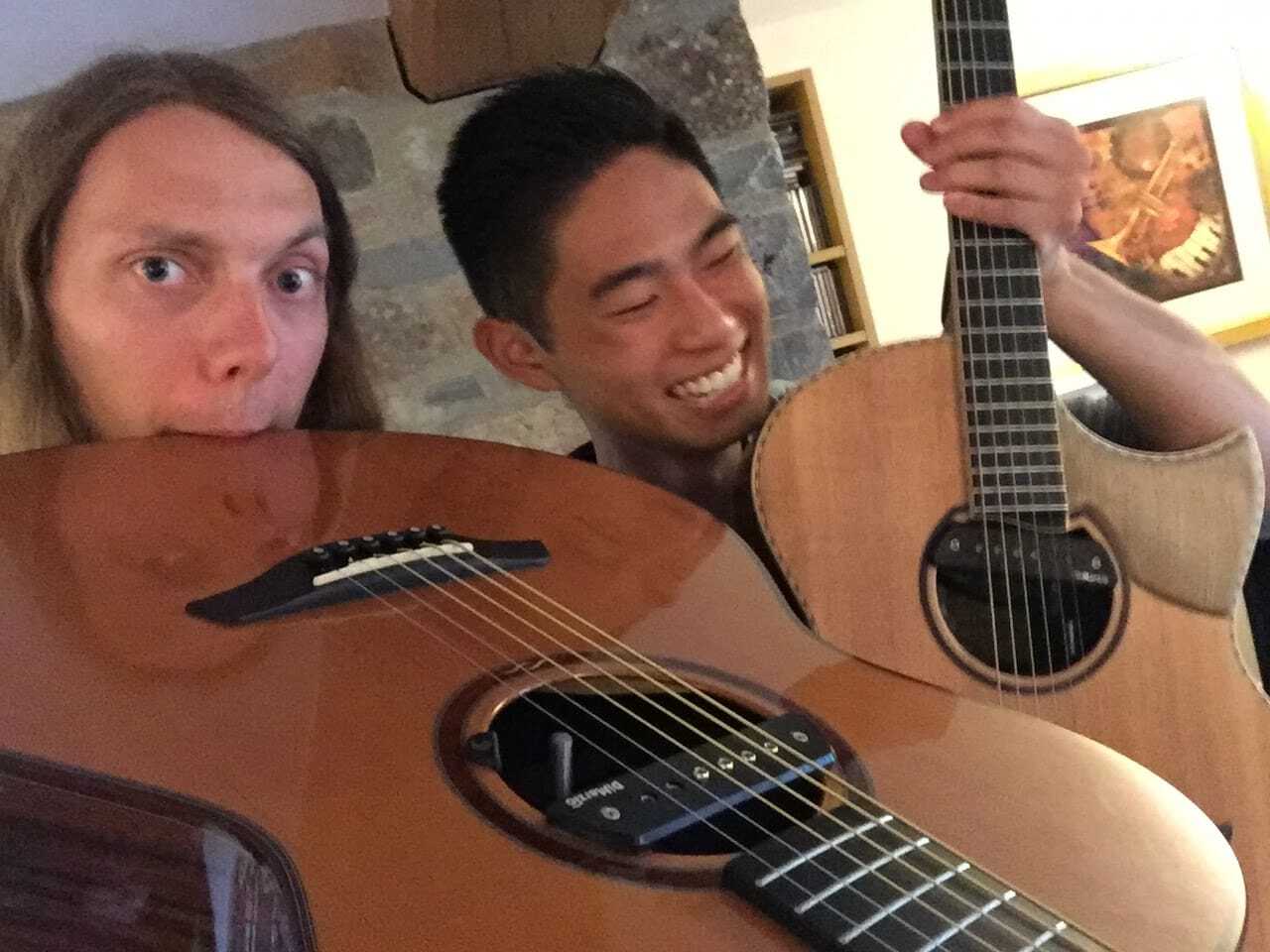Imagine dedicating your life to music, only to find yourself battling constant financial stress and worsening mental health.

I only sing when I’m broke…
Across the globe, musicians dedicate their lives to their art, yet many find themselves caught in a relentless cycle of financial stress and declining mental health. This crisis is not confined to any one country; it’s a shared struggle that spans continents and cultures.
This is the reality for over 60% of musicians in Australia since the COVID-19 pandemic.
Across the pond in the UK, over 70% of musicians are grappling with mental health challenges, a stark reminder that the struggle is all too real. According to the Musicians' Union, the weight of financial instability and job insecurity looms large over many artists, often becoming a heavy burden to bear.
In the United States, the numbers are equally alarming—73% of independent musicians have reported facing mental health issues, with financial pressures identified as a major contributor. The echoes of the pandemic’s fallout are still felt, illuminating the undeniable link between money woes and mental wellness.
We live in a world where money is a necessity. It provides us with three of life’s fundamental needs: food, shelter, and clothing. Beyond that, it grants access to healthcare, education, and even occasional luxuries. Having enough money offers the freedom to pursue what you want, when you want, with whoever you want.
Yet, money remains a difficult topic to discuss—especially for musicians.
The Financial Taboo in Music
Historically, many cultures have discouraged open conversations about financial struggles or successes.
Thankfully, we are slowly becoming more comfortable with these discussions, yet for musicians, the topic often remains contentious. In certain genres, such as jazz, seeking a high-paying gig can lead to being labeled a “sellout.”
Many musicians will go to great lengths to avoid discussing money management or business. Some may even choose to struggle for their next meal rather than confront their financial realities. But why is this the case?
Why do some musicians view money, a tool that can provide access to life’s necessities, as a taboo subject?
The Not-So-Glamorous “Struggling Musician”
The archetype of the “struggling musician” is glorified in our culture. From Charlie Parker to Elton John, we idolize those who faced bankruptcy yet dedicated themselves to their art, practicing relentlessly for their passion. For aspiring musicians, the image of living in a van, touring the world, and playing in iconic venues is a dream—a romanticized version of a life free from conventional responsibilities.
Yet, this narrative can be misleading. When asked about their motivations, many musicians assert, “I don’t play for money; I play for the love of it.” There’s nothing wrong with pursuing a career driven by passion. In fact, music is one of the few fields where people often prioritize love over financial gain. In contrast, professionals in business or digital marketing might say, “It pays the bills.”
Let’s draw a comparison:
In digital marketing, seeking a higher-paying promotion is celebrated.
In music, a musician pursuing a lucrative record deal may be criticized and labeled a “sellout.”
In business, turning a venture into a franchise is viewed as a savvy move.
In music, a jazz artist changing genres for better pay risks losing respect and credibility.
To outsiders, it may seem absurd that a musician would forgo a substantial paycheck to maintain their artistic integrity. This mindset significantly contributes to the long-standing mental health issues in the music industry. While we may admire Bob Marley’s philosophy—“my richness is my life”—this attitude can lead to financial stress and declining mental health for many musicians.
COVID-19 Made A Existing Problem Even Worse
The pursuit of a music career has long been viewed as financially precarious. With the arrival of the COVID-19 pandemic, that risk escalated. Musicians faced unprecedented challenges, with many losing up to 27 gigs in just three days as cancellations swept across the industry. This chaos led to a staggering 61% increase in anxiety levels among Australian musicians.
The story is similar in the U.S., where 61% of musicians reported heightened stress and deteriorating mental health due to pandemic-related financial pressures. The fallout from COVID-19 has intensified the mental health crisis in the music industry and hindered progress in mental health support for musicians.
As the world slowly reopened in 2022, the financial impact of the pandemic was far from over. Many beloved music venues closed permanently, and those that remained open often hesitated to resume live music due to financial instability. Musicians returning to the stage found themselves earning less as venues cut costs to survive.
Why Financial Education Is Crucial
Earlier, I mentioned that for many, true financial freedom means having the ability to do what you want, when you want. This sentiment is universal, transcending professions. For musicians, financial freedom could mean not stressing about the next gig and playing their instrument purely for joy.
Regrettably, many musicians lack effective financial education, a subject rarely included in their formal training. Throughout my journey, I’ve had countless conversations about iconic guitarists but have struggled to find discussions about music business or financial management.
During my time at the Sydney Conservatorium of Music, I encountered 100 classes focused on craft and technique but only two dedicated to business and financial management. This disparity is concerning, especially since financial stress is a primary contributor to the mental health crisis among musicians.
My Path to Financial Independence

Mike and I enjoyed a good chunk of wood
In 2017, I embarked on a three-month journey across Europe and North America, meeting some of the world’s most exceptional fingerstyle guitarists, including Mike Dawes, Stuart Ryan, Don Ross, Calum Graham, Antoine Dufour, and Tommy Emmanuel. I gained invaluable insights into the music business and the harsh realities of being a touring musician.
What struck me most was that these successful artists prioritized treating their music careers as businesses without sacrificing their artistic integrity. For example:
Stuart Ryan became a sought-after composer for radio and TV, authored guitar education books, and writes for major guitar magazines, allowing him to live comfortably.
Mike Dawes found success with Justin Hayward and the Moody Blues, leading to opportunities that secured his financial stability. He’s also one of the greatest acoustic guitar players of the last 20 years (in my opinion) and a bloody good guy!
Maneli Jamal transitioned from full-time touring to building an online guitar education platform, showcasing adaptability and foresight. His music will surely tug on your heart strings, and is the perfect accompaniment for mindfulness.
Witnessing their successes solidified my belief that musicians could achieve financial stability while staying true to their art.
Upon returning from my travels, I launched the “Brian Zhang Fingerstyle Guitar School.” Between 2017 and 2023, I not only started earning money for the first time in my life but also began saving. While I wasn't making massive amounts, I generated enough income to achieve several milestones:
I moved out of home at 23.
I paid my rent and bills on time.
I enjoyed outings with my girlfriend every other Saturday.
I could buy meaningful gifts for loved ones on their birthdays and holidays.
I saved a bit every month.
I traveled internationally again in 2022 and 2023 with my girlfriend.
None of this was easy. True financial security isn't in my DNA as a musician at heart. I had to work diligently to ensure that money remained in my bank account. However, by managing my finances well, I often went to sleep knowing that money wouldn’t be a source of stress the next day.
Now, I want to be transparent about my financial journey. Some may view this as showing off, and I accept that; I used to feel the same way. However, if you see it as an honest account of progress, I appreciate you reading this far.
Here's a brief breakdown of my earnings and savings from 2018 to 2022 thanks to my music school and other ventures:
In 2018, I made $55,000, ending the year with $33,834 in savings.
In 2019, I made $65,000, ending the year with $71,726 in savings.
In 2020, I made $71,000, ending the year with $90,000 in savings.
In 2021, I made $65,000, ending the year with $124,000 in savings.
In 2022, I made $81,000, ending the year with $137,000 in savings.
Now if I’m being honest, things haven’t been great since 2023.
Long-time subscribers will know that my mental health has gotten worse since 2023, and one of the reasons has been financial stress.
But when I look back at this period in my early 20s, it gives me a little bit of hope, knowing that I learnt not just how to make money, but how to SAVE money.
I Want To Remind You That Chasing Money Doesn’t Make You a Sellout

Imagine a world where a musician, deeply committed to their craft, dedicates countless hours to practice, composes breathtaking songs, and gives every performance their all. This musician plays in multiple bands, enjoys solo gigs, and yet can pay all their bills on time, provide their children with a good education, buy gifts for special occasions, and take a well-deserved break without the gnawing anxiety of financial instability.
Now imagine that this same musician takes a position that not only brings them career satisfaction but also a commendable paycheck. Rather than being labeled a sellout, they’re celebrated by peers for their success.
Just like the stigma attached to mental illness, it’s high time we start dismantling the stigma associated with musicians chasing financial security, especially among jazz and classical artists.
When Wes Montgomery, often hailed as one of the greatest jazz guitarists of all time, achieved commercial success in the late '60s with his album A Day in the Life, he faced backlash. Many fellow jazz musicians and fans branded him a sellout for producing an album of contemporary pop hits. What many overlooked was that Montgomery had a family of seven to support—he simply needed to pay the bills.
While his life on the road led to some of the most celebrated jazz albums, it didn’t help him provide for his loved ones.
Ultimately, musicians are entitled to make decisions that support their well-being—financially and mentally. Money can help alleviate some of the burdens, allowing musicians to focus on their craft. By fostering a culture where it’s acceptable to discuss financial security without fear of judgment, we can pave the way for future musicians to thrive both in their art and finances.
Final Thoughts
As we push the conversation about mental health and financial stability forward, remember that chasing money doesn’t make you a sellout. It’s a necessary tool that can provide access to a life of fulfillment and joy. I encourage you to reflect on your own financial journey and seek resources that can help you create a more secure future while pursuing your passion for music.
I’m thinking of introducing a paid tier to the newsletter, but only if it genuinely adds value for you.
- An Extra Weekly Newsletter: More insights, stories, and strategies each week.
- Top 5 Takeaways PDFs: Downloadable guides summarizing the most important lessons from each newsletter.
- Monthly Zoom Meetups: A live session where I share insights on mental health challenges in music (like anxiety and imposter syndrome), plus space for us to open up and support each other.
- Audio Narration: An audio version of each newsletter so you can listen on the go.
P.S. Today’s newsletter was a long one, so I want to thank you for taking 10 minutes of your day to read this.
I know the topic of money for any artist can be a tough one to talk about.
But it is a conversation we must have, and the sooner we break the stigma attached to money, the sooner musicians will be given the chance to thrive.
I hope today’s newsletter, as polarising as it can be, gave you some hope and reassurance about your own music career.
Before I go, I want to ask you what is your relationship with money?
I’d love to know, so please don’t hesitate to reply to this email with as much as detail as you’d like.
You can also shoot me a DM on all my social platforms:

